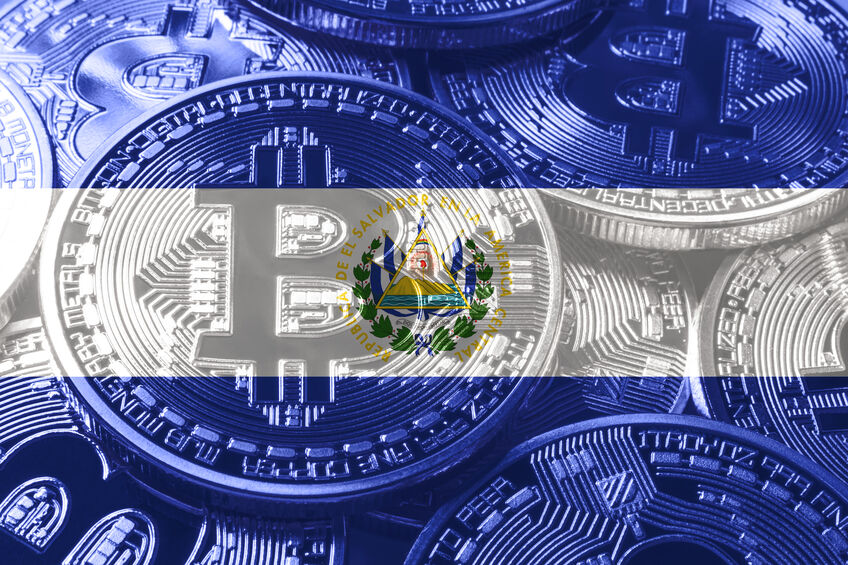Articles by Adam Zaki
Adam is a Reporter from Long Island and graduate of Brooklyn College.
IRS Snooping Flexes Government Power, but May Drive Crypto
September 14, 2021 To fight tax evasion, the federal government wants the IRS to track any account in the United States that transacts more than $600 in or out over the course of a year. The tracking will apply to banks and other financial institutions. The feds claim that they will use any found tax dollars to help finance the administration’s new $3.5 trillion spending plan.
To fight tax evasion, the federal government wants the IRS to track any account in the United States that transacts more than $600 in or out over the course of a year. The tracking will apply to banks and other financial institutions. The feds claim that they will use any found tax dollars to help finance the administration’s new $3.5 trillion spending plan.
Such a move could push a suspicious populace into crypto, where records, however openly recorded on blockchains, could potentially obscure the parties involved.
Banks have fought against the government’s push to share account transactions, as they argue it will be a major invasion of privacy. This will undoubtedly create an entire new workload for them as well, as the banks will have to provide intricate details on most of the accounts on their books — an unprecedented task.
“I don’t believe that much is going to change,” said Yoel Wagschal, a CPA. Wagschal stresses to his clients to always live their life as if the government has access to the information about their spending habits for the sake of their wellbeing.
“The issue at hand is how far this is going to [go], how far the government’s reach will be,” said Wagschal. “When a government body gets power, they don’t give it back. Look at the power wagon they are on.”
As crypto becomes more of an avenue to store and invest money, it may also be a new channel for coin holders to keep their finances shrouded behind additional layers from the federal government.
Lenders, Funders Look to Expand as 2021 Heads Into Final Stretch
September 14, 2021 As the year ends, lenders and funders across the globe are looking to meet goals, help businesses, and close the books on some of the most unpredictable months the industry has ever seen. Whether it comes to improving technology, hiring more staff, or creating completely new concepts on how to do business, any company worth its salt isn’t just going to be content with just staying stagnant.
As the year ends, lenders and funders across the globe are looking to meet goals, help businesses, and close the books on some of the most unpredictable months the industry has ever seen. Whether it comes to improving technology, hiring more staff, or creating completely new concepts on how to do business, any company worth its salt isn’t just going to be content with just staying stagnant.
“Our main goal for this year’s end is to scale our small business loan and MCA deal flow in order to maximize our syndication opportunities, which we want to overtake commission as our primary revenue stream,” said Zack Fiddle, President of CapFront. “We’ve already built a robust CRM and marketing automation system over the past year, we have great people and a proven process and product, and we just moved to a much larger space.”
From a brand-new office in Garden City, Fiddle seems to be expanding his company on multiple fronts. “The next step for us is hiring more support staff and more account managers to handle more leads from increased media [spending] and more referrals from our various business development channels,” he said.
Other fintech brands are looking to come up with new ideas surrounding borrowing. “We are coming out with a special lawyer loan,” said Justin Leto, co-founder and CEO of Miami-based Idea Financial, whose recent announcement about LevelEsq will allow the firm to divi out loans to attorneys who wait to get paid until when —or if — their client wins. “We’ll have the only insurance product that is available on the market that will cover the downside risk that the case [the attorney] is borrowing on goes to trial and loses.”
“It’s a really exciting time here at Idea Financial because we are able to leverage a lot of our existing resources and expertise to enter an entirely new market, which is legal lending,” said Larry Bassuk, co-Founder and President of Idea Financial.
Other firms are taking the current political and social climates into consideration when it comes to their end-of-year plans. “[We’ll] be analyzing risk a little more in case there is another lockdown,” said Drew Matthew, CEO of Infusion Capital Group. The two-person firm doesn’t plan to expand their staff too much going into the new year, but Matthew did flirt with the idea of bringing on an ISO-rep as his business expands.
“I think we’re going to pick up dramatically,” said Matthew when asked about the number of his future clients. “Once there’s no more [covid restrictions], SBA money, or no more fear of another pandemic shutdown, no matter what [we charge], the small businesses in America need us.”
This risk and surrounding political climate have no influence on the location of Infusion Capital’s offices in the future. “I know everyone is going down to Florida, but not us,” said Matthew. “New York or nowhere, baby.”
As seasons change and the year ticks its final months, lenders, much like the businesses they support, are looking to find the next best way to edge out competitors while offering the best product and services for their customers.
Media, Market Duped Again in Fintech Fake News
September 13, 2021 Multiple media outlets fell victim to a major hoax Monday morning, after GlobeNewsWire claimed that Walmart was beginning to accept Litecoin as tender for purchases in its stores. The wire seemed legit — a formally structured release from a credible source that was packed with quotes form Walmart’s CEO Doug McMillon about the company’s apparent move.
Multiple media outlets fell victim to a major hoax Monday morning, after GlobeNewsWire claimed that Walmart was beginning to accept Litecoin as tender for purchases in its stores. The wire seemed legit — a formally structured release from a credible source that was packed with quotes form Walmart’s CEO Doug McMillon about the company’s apparent move.
With a bad link on the release alongside silence of the supposed partnership on Walmart’s end, skeptics quickly realized that no move was ever in the works. After denying the validity of the release, tons of major outlets began scurrying to announce the hoax.
The motive may have been to artificially inflate Litecoin, as it shot up 35% minutes after outlets ran with the story.
This is eerily like one of the industry’s most infamous hoaxes, when the news service known as Internet Wire made headlines for the wrong reasons back in 2000. Then 23-year old Mark Jakob was out almost $100,000 after shorting stock for the Emulex Corporation, which he attempted to recoup by writing a fake press release stating that the company was going to restate quarterly earnings as losses, and their CEO was quitting the company. Jakob was a former employee of Internet Wire and a community college student at the time.
His faux release resulted in Emulex losing over $2 billion in market cap, while Jakob netted almost a quarter of a million dollars to cover his shorts and then some.
Jakob later pled guilty to creating the fake release in order to cover his shorts. He earned himself over 40 months behind bars, forfeited all of his earnings, and was handed a 6-figure penalty for his actions.
Then there was PRWeb’s publishing of a press release that falsely stated that Google had made a $400 million deal to purchase a Rhode Island- based wireless hotspot provider in 2012, which made the provider’s shares jump dramatically. Many major media outlets took PRWeb at their word and ran with the story. It was later discovered that the release was completely bogus and had come from a Gmail account that had originated in Aruba.
Reporting with one hundred percent accuracy is difficult. Information updates, numbers fluctuate, and deadlines loom. Vetting sources is an integral part of being a quality journalist, but even the best can get fooled, turning perceived truth into a manipulated consensus of reality.
In fintech news however, these hoaxes aren’t just blurring facts and changing narratives, they could result in the moving of billions of dollars around the market before the deception is revealed.
More TCPA Lawsuits Could be Inbound
September 12, 2021 Despite a significant drop in TCPA cases since 2018, a flurry of new TCPA cases could be on the horizon as TCPA plaintiff attorneys had been telling clients to hold off — pending the reaction of Facebook’s recent Supreme Court case, according to Michael O’Hare, Chairman of Colorado-based Cashyew and operator of the TCPA Litigator List. The Court ultimately narrowed the definition of an autodialer.
Despite a significant drop in TCPA cases since 2018, a flurry of new TCPA cases could be on the horizon as TCPA plaintiff attorneys had been telling clients to hold off — pending the reaction of Facebook’s recent Supreme Court case, according to Michael O’Hare, Chairman of Colorado-based Cashyew and operator of the TCPA Litigator List. The Court ultimately narrowed the definition of an autodialer.
O’Hare heads a service that provides names of individuals and their attorneys who have sued under the TCPA law, protecting his clients from what has become an industry in and of itself.
“It’s a fight between free speech and privacy,” said O’Hare, when asked what the hardest part about leading an organization that protects businesses from falling victim to these kinds of suits is. He worries that his clients will be preyed upon by serial litigators that go after businesses searching for some type of settlement. According to O’Hare, some of these cases can cost tens of thousands of dollars to fight in court.
“The government has empowered citizens to become the enforcer,” said O’Hare. The law allows citizens to privately sue unsolicited callers who disrupt their daily lives, subsequently creating an entire industry out of these kinds of suits alone.
“People are making a 6-figure living,” he said.
Since deBanked covered this minefield back in 2016, the TCPA has not changed. Some states like Florida and California have adopted their own versions of the law, but the federal law has gone unchanged for thirty years.
The robocallers have also adapted to the lack of upkeep of the TCPA, as the concept of “spoofing” has become a weird ethical gray area in the telemarketing industry. By showing the area code that’s identical to the number being dialed on that number’s caller ID, the user is believed to be more likely to answer. Not covered by the TCPA, organizations like the FCC have begun to step in and put a stop to the tactic.
This “decentralization of enforcement,” as O’Hare called it, may do more harm than good, giving these serial litigators and their clients more avenues of reason to sue.
The ambiguity of what defines a work phone versus a personal phone is much more prevalent now than it was in 1991. With cell phones, smart watches, and the elimination of the home phone for millions of Americans, the TCPA has become antiquated.
“Do they want us to go back to a rotary phone?” O’Hare sarcastically asked.
O’Hare stressed that lenders respect their clients and abide by basic ethics. “Always be scrubbing,” he said. “Prevention is not expensive, litigation is”.
Besides using services like his, O’Hare suggests using basic ethics and understanding to protect merchants that don’t want their calls. “If someone asks, take them off the list,” he said, “avoid trouble and respect the Do-Not-Call list.”
America’s Football Fans Are About to Meet SoFi
September 9, 2021 When fans of the Los Angeles Rams return to the team’s new stadium for a Week-1 matchup with the Chicago Bears on Sunday, a large fintech brand will be there to welcome them. SoFi, the non-bank that shunned banks until it became a bank itself, secured the naming rights to the football stadium last season in Inglewood where both the Rams and Los Angeles Chargers play home games. (Covid prevented fans from actually attending in 2020.)
When fans of the Los Angeles Rams return to the team’s new stadium for a Week-1 matchup with the Chicago Bears on Sunday, a large fintech brand will be there to welcome them. SoFi, the non-bank that shunned banks until it became a bank itself, secured the naming rights to the football stadium last season in Inglewood where both the Rams and Los Angeles Chargers play home games. (Covid prevented fans from actually attending in 2020.)
It’s one of the boldest marketing campaigns ever taken on by a fintech player, a $400 million gamble of a deal that attempts to bring the legitimacy of the brand to a new level. Whether SoFi’s ambitions will bring millions of new customers into their fold or if the group has been overcome by vanity will be played out over the course of the 20-year deal between the stadium and SoFi.
A big thank you to @lapublichealth, the medical community and first responders + everyone doing their part.
WE’LL SEE YOU AT @SOFISTADIUM THIS FALL!
— Los Angeles Rams (@RamsNFL) May 25, 2021
Sofi’s logo is not just exclusive to the rafters of the 70,000+ seat stadium. It’s on the tickets, television broadcasts, repeatedly said on radio broadcasts, and will be mentioned on millions of social media posts throughout the upcoming seasons. Superbowl 56 will be played this February at SoFi Stadium, and the venue will be a major contributor to Los Angeles’ hosting of the Summer Olympics in 2028.
The stadium can also reach potential customers outside of the sports world. The Rolling Stones, Kenny Chesney, Motley Crue, and Def Leppard are scheduled to hold concerts at SoFi over the next few years, bringing hundreds of thousands of people to the stadium — all of whom will be exposed to the SoFi brand.
Rams owner Stan Kroenke, who used $5 billion dollars of his own money to build SoFi stadium, resonated with the company’s goals when announcing the stadium’s name last year. “It would be impossible to build a stadium and entertainment district of this magnitude without incredible and innovative partners who share our ambitions for Los Angeles, our fans worldwide and the National Football League” said Kroenke. “Since breaking ground at Hollywood Park, more than 12,000 people have worked side-by-side on this project, and we are proud to now have SoFi join us on this journey”.
Much like big banks that have name recognition, SoFi is just one of many who have their name on a stadium. Chase Field in Arizona, TD Garden in Boston, and Citi Field in New York are some of the costliest stadium naming rights in the industry.
It seems that if you want to be a big bank, having your name on a stadium is a rite of passage.
Derek Jeter Joins Athletes Looking to Cash in with NFTs
September 7, 2021 The trendiest merch in tech has made its way into the world of professional sports and entertainment, as professional athletes have begun selling NFTs. DraftKings Marketplace already offers several tiers of NFTs from Tom Brady, Simone Biles, and Wayne Gretzky—some of which are valued at over $167,000. Jeter’s NFT will be dropped Tuesday afternoon in two separate bids.
The trendiest merch in tech has made its way into the world of professional sports and entertainment, as professional athletes have begun selling NFTs. DraftKings Marketplace already offers several tiers of NFTs from Tom Brady, Simone Biles, and Wayne Gretzky—some of which are valued at over $167,000. Jeter’s NFT will be dropped Tuesday afternoon in two separate bids.
“We are excited to bring this special Derek Jeter offering exclusively to our DraftKings Marketplace customers, and believe it will have a place in history as our first digital baseball collectable drop,” said Matthew Kalish, co-founder and President of DraftKings North America to deBanked. “There has been such a strong and positive response from our community around the iconic athlete drops so far, and Derek Jeter, the iconic Yankees superstar and soon-to-be Hall of Famer, will be no different. We look forward to seeing thousands of collectors add to their digital collections this week on DraftKings Marketplace.”
Alongside age requirements specific to the state in which the purchase takes place in, potential buyers must also have a verified DraftKings account with all of the terms and conditions agreed upon.
Hosted by the NFT platform Autograph, Jeter is one of the many athletes that sits on the board of the company. Co-Founded by Brady, all the athletes that have had NFTs sold through DraftKings thus far are the board of advisors for Autograph.
 With a reliance on live events, merchandise, and sponsorships with brands to engage with millions of viewers, the NFT market is an interesting platform for athletes to take the trading card to the digital space, while also opening up another avenue of revenue outside the arena.
With a reliance on live events, merchandise, and sponsorships with brands to engage with millions of viewers, the NFT market is an interesting platform for athletes to take the trading card to the digital space, while also opening up another avenue of revenue outside the arena.
“As the world becomes more comfortable with digital ownership and collection, we see an incredible opportunity to bring users high-quality and personalized content from their favorite athletes, artists and franchises,” said Dillon Rosenblatt, Founder and CEO, Autograph. “NFTs are the perfect medium to connect users to both the things they love and those who share those interests, and we want to leverage today’s incredible partnerships to provide continued value to our community.”
Autograph has also teamed up with Lionsgate to develop NFTs with their most successful films, continuing their push to develop a marketplace of purely entertainment-based NFTs.
A source at DraftKings was able to confirm that more athletes are going to be releasing NFTs on the platform within the next couple of weeks.
El Salvador Becomes First Bitcoin Nation as 70% of Country Remains Unbanked
September 7, 2021 With over $20 million in Bitcoin, the El Salvadorian government is set to put the basis of their already crumbling economy on the back of the world’s most sought-after cryptocurrency. President Naykib Bukele took to Twitter over the weekend to boast about his country’s unprecedented economic shift in a time when 70% of residents lack access to traditional financial services.
With over $20 million in Bitcoin, the El Salvadorian government is set to put the basis of their already crumbling economy on the back of the world’s most sought-after cryptocurrency. President Naykib Bukele took to Twitter over the weekend to boast about his country’s unprecedented economic shift in a time when 70% of residents lack access to traditional financial services.
In a country where roughly half of its population has no internet access, the government has released a state-sponsored app (called Chivo Wallet) that will allow its citizens to buy goods using Bitcoin the government owns. Mostly dominated by the US Dollar, the local economies of El Salvador will now be forced to accept Bitcoin as legal currency.
Each citizen who uses Chivo will be given $30 worth of Bitcoin to jumpstart the spending.
Buying the dip 😉
150 new coins added.#BitcoinDay #BTC🇸🇻
— Nayib Bukele 🇸🇻 (@nayibbukele) September 7, 2021
The move has faced backlash from all different types of groups including economists, politicians, and investors. The world is watching to see if this shift in currency will help pull the country out of its troubles, or if it is more public relations posturing — at the expense of the El Salvadorian economy.
The United States top official in El Salvador, Jean Manes, referred to the nation at a press conference Saturday as “a democracy in decline” as the move is just one of a handful of that technically increase the power of the federal government in the small country. Manes compared Bukele to the likes of Hugo Chávez, using his notoriety with the population to cover up a strategic economic collapse and dismantling of democracy.
The El Salvadorian embassy did not immediately respond to a request for comment.
The value of Bitcoin dropped by 15% against the US dollar on the day of its debut.
SEC Charges BitConnect With $2B Crypto Fraud
September 6, 2021 The SEC filed an action against BitConnect last week, accusing two of the firm’s executives for defrauding retail investors by offering a digital asset investment program — while fudging the numbers. The company is accused of cheating investors out of an estimated $2 billion.
The SEC filed an action against BitConnect last week, accusing two of the firm’s executives for defrauding retail investors by offering a digital asset investment program — while fudging the numbers. The company is accused of cheating investors out of an estimated $2 billion.
“We allege that these defendants stole billions of dollars from retail investors around the world by exploiting their interest in digital assets,” said Lara Shalov Mehraban, Associate Regional Director of SEC’s New York Regional Office. “We will aggressively pursue and hold accountable those who engage in misconduct in the digital asset space.”
Stemming from a civil case in May, Bitconnect founder Satish Kumbhani is accused of lying about his company’s profits while also violating registration laws that are put in place to protect investors. The charges also extend to Glenn Arcaro and his firm Future Money Ltd, as they’re accused of receiving fraudulent commissions from BitConnect of up to $24 million for acting as their promoter.
According to the SEC, investors were told that BitConnect used a “volatility software trading bot” that promised returns of 40% per month while also being shown false returns depicting 3,700% annualized gains. The commission called BitConnect’s actions a “textbook Ponzi scheme” where they are being accused of paying old investors with new investor money.
Arcaro appeared before a judge last Wednesday, pleading guilty to a related criminal wire fraud conspiracy charge in California. He is to be sentenced on November 15. Kumbhani, an Indian citizen, is reportedly a fugitive.
According to the SEC’s report, two of the five promoters have already settled in a related action for promoting the BitConnect offering. The commission has also obtained judgments that require promoters Michael Noble, Joshua Jeppesen, and Jeppesen’s fiancé to pay over $3.5 million and 190 bitcoin.
The complaints seek injunctive relief, disgorgement plus interest, and civil penalties.
In internet pop culture, BitConnect achieved “meme status” in 2017 when an investor went wild at a BitConnect conference, was captured on video, and was viewed half a million times on youtube. He was not personally named in the SEC complaint.































